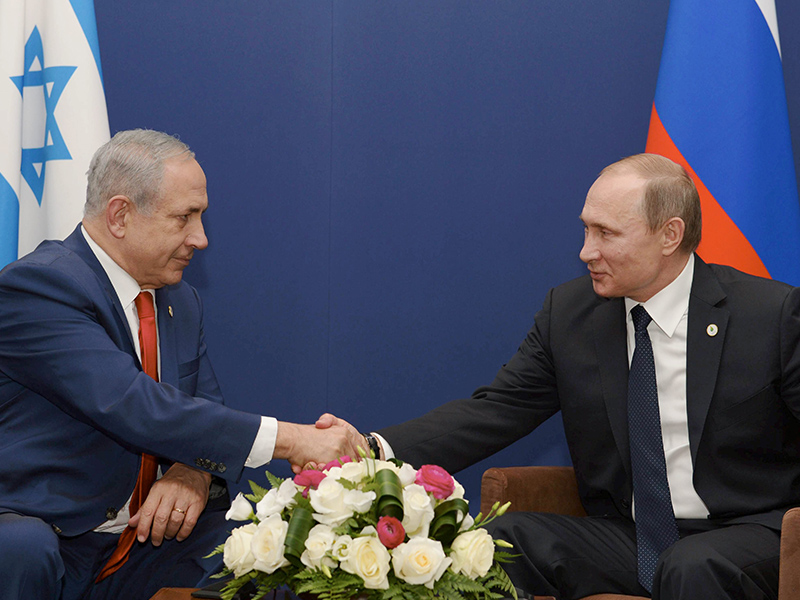The recent closeness between Israeli Prime Minister Benjamin Netanyahu and Russian President Vladimir Putin, shown in meetings in Moscow and Paris, is nothing new, says a Russian-Jewish community leader in Toronto.
“I don’t think it’s sudden,” Igor Korenzvit, chair of the Jewish Russian Community Centre of Ontario’s board of governors, told The CJN.
Growing up, Putin “had very special feelings about Jews that he expressed many times before,” said Korenzvit, who also sits on The CJN’s board of directors. “So I’m not surprised by the way he’s acting toward Netanyahu and Israel.”
READ: Meeting between Trudeau and Netanyahu described as ‘warm’
The two leaders have met twice recently. In September, Netanyahu visited Moscow to discuss security concerns along Israel’s northern border and how to avoid accidental clashes between Israel and Russian forces supporting President Bashar Assad’s regime in Syria.
Netanyahu also expressed concern to Putin that Russian weapons will end up in the hands of Hezbollah, fighting in Syria on Assad’s side. Putin reportedly sought to reassure Netanyahu that his fears of Syrian and Iranian aggression in the Golan were unfounded, saying the Syrian army “has no time for a second front” and artillery attacks against Israel “are being carried out by unofficial systems.”
At the recent Paris climate summit, Netanyahu and Putin spoke on the sidelines for 45 minutes about Syria. Both boasted of Russian-Israeli military co-operation and promised to expand it.
High on the agenda was Moscow’s anger at Turkey’s shooting down of a Russian warplane that Turkey said had crossed into its airspace. Israel said it would be more careful if Russian aircraft ever entered its territory.
Some observers also said Israel’s closer ties with Russia were, in part, retaliation against the European Union for its decision to label products made in Jewish settlements,
Body language and the words Putin used in the meetings suggested a “friendly” relationship with Netanyahu, Korenzvit said, “much better than [with U.S. President Barack] Obama.”
“Even before the trip to Moscow, I was aware of a number of facts [showing] Putin was friendly toward Israel and definitely gets along with Netanyahu. I didn’t find anything new at all.”
Rather than admiration, Putin feels “respect” for Netanyahu, Korenzvit said. And now, “the world gave them more opportunity to express their relationship.”
Aurel Braun, professor of international relations and political science at the University of Toronto, doesn’t think relations are as warm as they appear.
“Netanyahu has tried to make the best of a bad situation. Israel has no choice but to try and have good relations with Russia, because the options Israel has are rather limited. Russia has inserted itself in a major way into the Middle East conflict, and it has put Israel in a position where it is facing a kind of fait accompli in the absence of effective western action in Syria,” Braun told The CJN.
READ: What’s Russia up to in Syria?
Israel has been ineffective in preventing Russia from supporting Iran economically and militarily, Braun said.
But Russia does want to co-ordinate with Israel to avoid a Turkish-style accident over Syria, he added.
Braun agreed with observers who noted that Netanyahu shares with Putin a disdain for what both see as weak U.S. leadership. Their meetings are “another way for Putin to rub Obama’s nose in it and say, ‘You have very bad relations with Israel, I can deal with Netanyahu and he has some alternatives to you.’ It’s to show up and weaken the U.S. In that sense, Netanyahu is a useful element [for Putin].”
Some of the warmth between the two is genuine, Braun added. “Unlike Soviet leaders, Putin is not an anti-Semite and is not anti-Israel. On a personal level, Putin has good relations with Jews.”
But Russia’s involvement in the Middle East is bad for Israel, he said. “Putin is helping Assad stay in power. Assad’s closest ally is Iran, which is supported by Hezbollah. How is this possibly in Israel’s interest?”
Russian-Israeli ties are “more like a business relationship,” says Zhana Levin, co-editor of the Russian-Jewish biweekly newspaper Nasha Canada.
It’s a balancing act, she said. Putin needs Israel as he makes enemies in the Arab world, while “having Putin as an enemy of Israel would be too much.”
But, she stressed, “I don’t think it’s a friendship… no leader of a normal country, would make friends with Mr. Putin. But this is business.”
